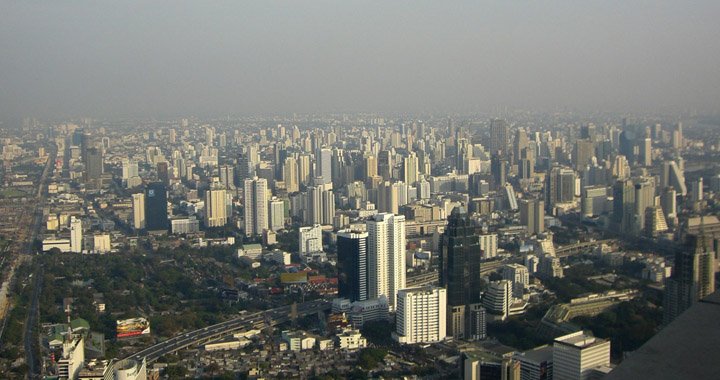Bangkok’s second wave of smog this year seems to be lifting but don’t be too eager to remove your mask yet; it could get worse in the coming weeks.
Last week, according to AirVisual.com, Bangkok was the 2nd most polluted city in the world. It has since slipped down to the 30s and is now surpassed by Chiang Mai. However, Chiang Mai’s pollution usually comes from its annual burning season when the rice fields are razed for fertility, around March and April each year. We’re not 100% sure why Chiang Mai’s air is worse than Bangkok’s right now but we have a couple of theories.
Inevitably some will claim that Bangkok is responsible for producing the smog cloud over Chiang Mai, but it’s easy to dismiss this as far-fetched. Bangkok was built on marshy ground only 1.5 metres above sea level, Chiang Mai sits atop a mountainous valley 310 metres above sea level. It’s almost certainly not the case that Bangkok’s smog has drifted northward and been carried uphill, only to rest so precisely upon another populous city. Chiang Mai is polluting itself.
The only remaining question is what is causing Chiang Mai’s smog outside of the burning season? The answer is probably from burning something other than fields; trash, the same thing that’s causing Bangkok’s smog. According to a Bangkok Post article, trash burning was to blame for the miasma that consumed Chiang Mai in March 2015, despite it also being the beginning of burning season. Thailand is also reliant on fossil fuels for power production, the combustion of which could also be another contributing factor to the pollution. Lastly and most obviously, we also have to take into account the pollution caused by traffic.
[dm]
Chiang Mai’s lack of a BTS or MRT system means that almost all domestic transport is petrol or diesel-powered, but we assume that the rate of this pollution is fairly consistent and should be seen as a contributor to the spike in air pollution rather than the cause.
It takes no great leap of the imagination to see why these are the most probable causes but why would people choose to burn trash at a time of year when the air is notoriously bad? Probably because they felt it would be less noticeable in the fug of the smouldering rice fields, as people know what to expect and many temporarily vacate the city. Instead, it actually caused more outrage than anything else because it spiked the city’s air pollution index, endangered drivers and smelled noticeably worse.
Unfortunately, if you’re currently in Bangkok or Chiang Mai the worst is far from over; AirVisual.com’s pollution forecast looks grim for both cities, with Chiang Mai’s air quality stabilising but Bangkok’s worsening significantly. If you haven’t purchased a mask already then you’ll still get plenty of mileage out of one if you buy it now; it’s far from too late. And even if the current pollution wave ends abruptly it will inevitably return again next year.
We only recommend masks with the PM2.5 standard (PM refers to ‘particulate matter’, 2.5 is the measurement of the particles in micrometers), as their filters are fine enough to prevent the inhalation of dirt too small for cheap masks to filter. The 3M M95 respirator is one example of a mask that claims to filter PM2.5 particles, something that your average 7-eleven surgical mask won’t do.
If you don’t own a mask already then we recommend ordering one from Lazada, as it will arrive in a matter of days and it’s something that you need urgently. Aliexpress is cheaper but far slower, with some items taking over 6 weeks to arrive.
If you already own an appropriate mask then there’s still more you can do to protect yourself from these harmful particles: install additional filters on your air conditioning units and only go outside when necessary.
This post is brought to you by DeeMoney, Thailand’s payment provider. Exchange and send money to 14 countries, register via our app, website or in store. DeeMoney currently has four Bangkok-based currency exchanges but more are on the horizon.
Send money to Australia, Bangladesh, Cambodia, China, India, Indonesia, Malaysia, Myanmar, Nepal, Pakistan, Philippines, Singapore, Sri Lanka, and Vietnam from just 150 baht per transaction plus an exchange fee.

